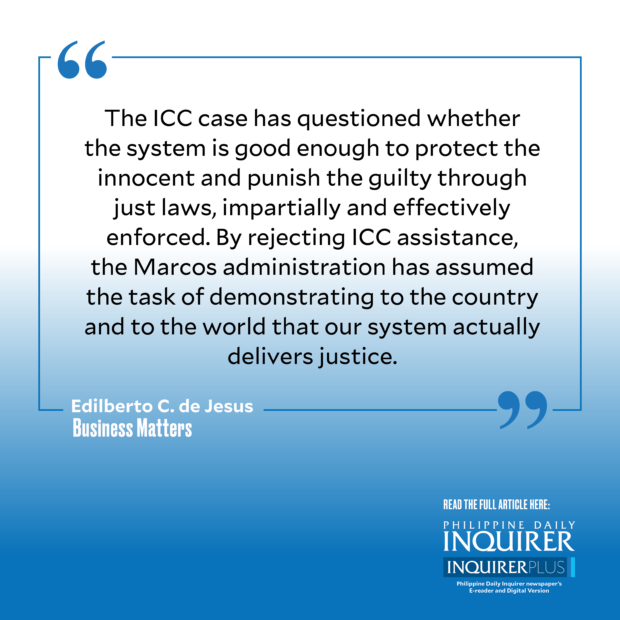Competence may be slipping but English continues to broaden and sharpen the penchant for word play. It remains strong enough to spice up the use of Filipino and add that touch of bitterness favored in Philippine cuisine by some to season Philippine humor. Perhaps, an acquired taste; the pun cuts too deeply for those believing they must endure injustice.
Many consider the “education crisis” as the country’s most fundamental challenge. Issues arising over the last decade suggest, however, that the justice system presents a problem as daunting, deeply-rooted, and even more urgent. Life-long learning options can compensate for poor basic education, a recourse unavailable to those unjustly executed. The bigger the bureaucracy—and the Department of Education’s (DepEd) is the biggest—the stronger the drive toward expansion and resistance to reforms that threaten this instinct. But because basic education standards are so clear, DepEd’s size and centralized character make gaps in performance easier to expose.
The justice system lacks this clarity, as it rests, not on one, but on five “pillars:” 1) law enforcement, mainly the Philippine National Police and the National Bureau of Investigation, with the Department of the Interior and Local Government’s (DILG) oversight; 2) prosecution under the Department of Justice (DOJ) leadership; 3) judiciary, under the Supreme Court; 4) corrections, through the DOJ’s Bureau of Corrections and the DILG’s Bureau of Jail Management and Penology; 5) community, which includes the Integrated Bar of the Philippines covering the legal profession and the law schools that are all under Supreme Court supervision, but casts a catch-all net encompassing individuals, families, and civil society groups.
While not explicitly entrusted with its own pillar, the legislature can impeach public officials found derelict in delivering justice. More critically, Congress can produce laws that serve justice or laws weaponized to promote vested interests. The system thus implicates multiple bureaucracies of all coequal branches of government. Justice is unlikely to flourish unless all five pillars carry their assigned weight.
This conditionality requires pillars strong enough to bear their burden and effectively balanced and aligned with each other. It also demands robust monitoring and maintenance to ensure that pillars remain capable of bearing a burden progressively becoming heavier with population growth. Wear and tear over the years have exposed eroded, weakened areas that their caretakers have tried to address with varying levels of energy and success.
Useless to debate which pillar must carry the greater weight; the structure can only be as strong as the weakest pillar. Seemingly conflicting demands on the system add formidable challenges. The laws and processes must be clear and consistently applied. But implementation must also be sensitive to the specific context of individual cases and, therefore, requires some flexibility. At the imaginable worst, the system may line up a circular firing squad that will surely kill the defendants, who may be innocent, but also inflict injury on the shooters.
The drug war has placed the heaviest stress on the law enforcement pillar. Presumably, with thousands of suspects allegedly victims of summary execution, the load on the prosecution to prove guilt, on the judiciary to render judgment, and on the correctional to enforce criminal sentences has correspondingly lightened. Especially, since few extrajudicial killing cases have been brought against law enforcement officials that would have required follow-up from the partner pillars. Media reports and the Social Weather Stations survey on corruption suggest that all of the justice pillars require reinforcement.
The International Criminal Court (ICC) investigation of crimes against humanity committed in the Philippines has now raised at the international level questions about its justice system. President Marcos says his administration will not cooperate with the ICC because the country already has a working system of justice. We already had in place this complex, intricately-constructed system with many moving parts that must mesh and harmoniously work together—and still we joined the ICC. As senator, Mr. Marcos supported ICC membership as necessary for the protection of human rights in the country. Are human rights better protected now than in 2011?
The ICC case has questioned whether the system is good enough to protect the innocent and punish the guilty through just laws, impartially and effectively enforced. By rejecting ICC assistance, the Marcos administration has assumed the task of demonstrating to the country and to the world that our system actually delivers justice.
—————-
Edilberto C. de Jesus is professor emeritus at the Asian Institute of Management.
—————-
Business Matters is a project of the Makati Business Club (makatibusinessclub@mbc.com.ph).


